In this ad, the imprint of a woman’s stiletto is her own body. Creative? Or creative and creepy?
Via Adverbox.
In this ad, the imprint of a woman’s stiletto is her own body. Creative? Or creative and creepy?
Via Adverbox.
The images below are fake ransom notes designed to encourage parents to get their children into treatment for autism, obsessive-compulsive disorder, asperger syndrome, and attention deficit and hyperactivity disorder (click image to enlarge). They were commissioned by the New York University Child Study Center, but quickly attracted enough outrage that the campaign was abandoned (see a summary of the controversy at Mental Illness Watch). They are interesting to me as a sociologist because of the way they construct mental illness (like a kidnapper who steals your child… so the child you have is not your “real” child), pharmaceuticals (the only way to get your real child back), and parenting (you are a bad parent if you don’t do what the experts tell you). It’s fascinating the way they use threats to “help” (“ignore this and your kid will pay,”this is only the beginning,” and “It’s up to you now”).
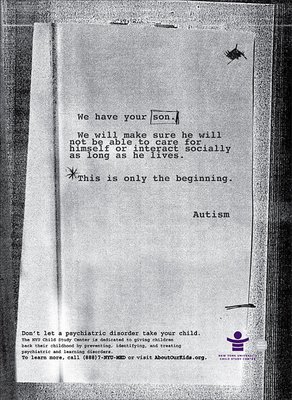 Text: We have your son. We will make sure he will not be able to care for himself or interact socially as long as he lives. This is only the beginning. -Autism
Text: We have your son. We will make sure he will not be able to care for himself or interact socially as long as he lives. This is only the beginning. -Autism
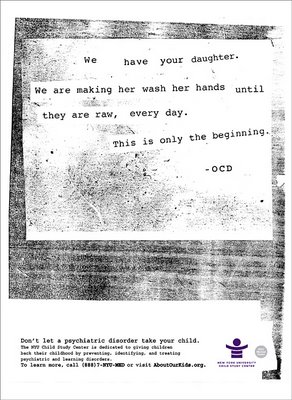 Text: We have your daughter. We are making her wash her hands until they are raw, every day. This is only the beginning. -OCD
Text: We have your daughter. We are making her wash her hands until they are raw, every day. This is only the beginning. -OCD
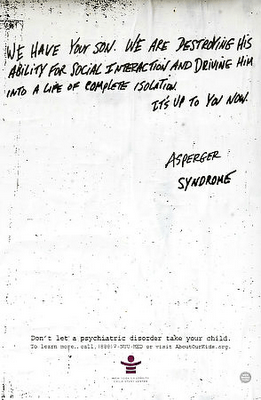 Text: We have your son. We are destroying his ability for social interaction and driving him into a life of complete isolation. It’s up to you now. -Asperger Syndrome
Text: We have your son. We are destroying his ability for social interaction and driving him into a life of complete isolation. It’s up to you now. -Asperger Syndrome
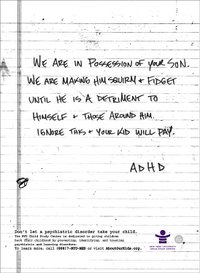 Text: We are in possession of your son. We are making him squirm and fidget until he is a detriment to himself and those around him. Ignore this and your kid will pay. -ADHD
Text: We are in possession of your son. We are making him squirm and fidget until he is a detriment to himself and those around him. Ignore this and your kid will pay. -ADHD
The 30-second (or so) videos below have been interspersed with MTV’s regular programming as part of Black History Month. MTV got Cornel West to be their superstar academic and expert on the Black American experience. The videos serve as the occasion for some interesting questions:
First, how do we evaluate the use of Black musicians, actors, and personalities by MTV? Is “representation” enough? Or does contemporary representation look uncomfortably like the representation of the past? (If you haven’t seen it, watch Spike Lee’s Bamboozled.)
Second, what does it mean that Cornel West signed on with MTV with what is, in effect, a mutual endorsement? Do we approve of Cornel West using his significant influence and importance in this way? Is this good from a reformist perspective? Problematic from a radical perspective? Did he “sell out”?
Third, how effective are these spots? I know little about the audience of MTV, but I imagine there are a lot of people who do not know who Cornel West is and are not inclined to offer him immediate respect. Cornel is idiosyncratic. Does your average MTV viewer see a gap-toothed, afro-wearing guy with odd mannerisms called “Professor” (which, we know, could mean anything) as authoritative? Or a buffoon?
Further, what do we think of the spots themselves? Is their content helpful? Do they teach us anything? Do we like what they teach us? Or is it just more empty lip-service to Black Americans?
Watch and tell us what you think:
[vimeo]https://vimeo.com/63979709[/vimeo]
[vimeo]https://vimeo.com/63979813[/vimeo]
Thanks to Richard for the heads up on this one.
Lisa Wade, PhD is an Associate Professor at Tulane University. She is the author of American Hookup, a book about college sexual culture; a textbook about gender; and a forthcoming introductory text: Terrible Magnificent Sociology. You can follow her on Twitter and Instagram.New (or new to me) body modification trends (the first four found here):
Look like a dragon (found here):

Likes spikes (found here):
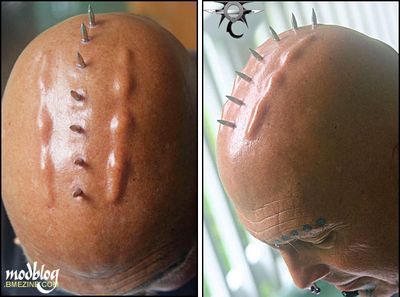
Eyebrows (found here):

Boob job (found here):
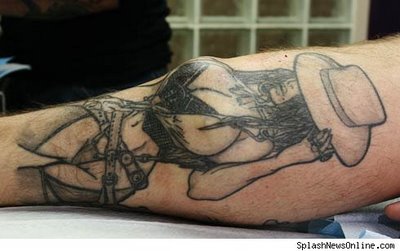
This one is braille (found here) :

It might be interesting to discuss the different reactions to the body modifications… that is, people might think the braille one is kind of sweet, but the boob job one as disgusting. How do we decide which body modifications are good or bad, neat or stupid, etc?
A picture of Bush laughing with attractive, shirtless, colorfully dressed men in Ghana:

Does anyone know anything about whether the Bush administration has been good for Ghana?
Found at TMZ under the headline “African Men Like Bush.”
This bit appears on the Maxim magazine website. It uses rape, and women’s apparent attraction to men who look like rapists, in order to be humorous. I think it’s particularly interesting that it includes a jab at a Republican (or is it just “the establishment”?). If they are obviously leftist/anti-establishment, are we to believe that they must be good guys, therefore this use of rape for comedic value is okay? Or is this just another manifestation of the equal opportunity insult comedy found in products like South Park and Knocked Up? There is a lot going on here and I’m pretty sure I have yet to fully grasp it. Any thoughts?[youtube]http://www.youtube.com/watch?v=EVcyNANK5cY[/youtube]
The image below is the cover of a comic book designed to teach adults about birth control (it seems to have been published in 1956 and again in 1962). Find it all online here.
Found here via copyranter.